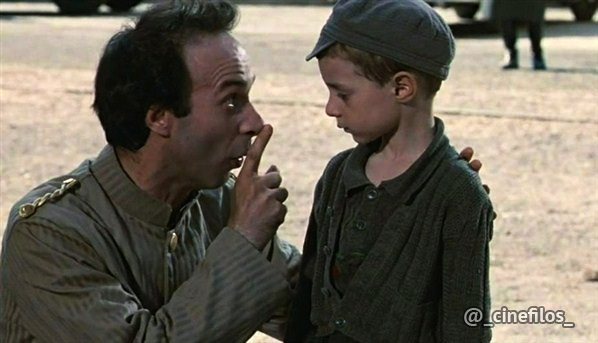While reading Maus, it was inevitable to
remember the Holocaust topic itself.
As you may remember, Spiegelman was criticized for
writing Maus since it seemed he diminished the relevance of the Jewish tragedy
by drawing a comic. This graphic novel shows two parallel worlds. On the one
hand, the story of Vladek, Artie's father, who experienced the Holocaust since
he was a Polish Jew. On the other hand, the story of Art and his father's interactions
in the present. By characterizing people in his comics as animals (cats, mice,
pigs, etc.), Art tried to simplify what happened and what he lived in the
Holocaust, instead of facing the horrible catastrophe in a sensible way.
This simplification of reality rang me a bell and I
remembered a special character called Guido Orefice, a Jewish man and main
character of Life is Beautiful. He was characterized by being very optimistic
and a concerned husband and father. When the Nazi era started, they were taken
away to a concentration camp. In order to distract his son Joshua, Guido
creates different situations and stories for hiding the true from Joshua. There
is a specific moment in the movie when a German woman calls Joshua to eat in a
room full of German children. Since his life was in danger, Guido suggests him
playing “The silence game”, in which the little boy was supposed to be quiet no
matter the circumstances. Unfortunately, he says “thank you” and a waiter
noticed it. After all, he is rescued by his father because Guido made children
speak Italian.
This situation reminded me of a particular scene in Maus, in
which Vladek was walking trying to get a streetcar when some children called him Jew. Those children looked for their mothers and Vladek had to act as one of them.
As you can see, Maus could be compared to Life is Beautiful since both try to show the Holocaust in a different and controversial way. On the one hand, Vladek put a mask in order to hide himself and try to be one of them, whereas Joshua had to act as a mute child and hide himself too from the German. On the other hand, both show an ironic view of society at that time, in which people were classified because of their race.
All in all, I can say that the Holocaus has been shown in ironic ways and in that sense, Maus has been one of the perfect samples.
As a final question, can you identify any other movie that shows the Holocaust in an ironic or different way?
P.s. I also remembered Prufrock's mask to face society and its connection with Vladek's situation. In that sense, Vladek had to wear a mask too in order to be part of society, the same as Prufrock.
P.s. In case you have not watched the movie, here you have a link :)
The situation described above goes from 88.00 to 92.20 minutes.





Well, personally I like to see Maus and Life is Beautiful as "light versions" to represent the Holocaust. On one hand, Maus lightens, as you mentioned, depicts two parallel stories, which, for me at least, were a relief, as Art's story interrupted some intense parts of Vladek's story with perfect timing. On the other hand Life is Beautiful shows the story of a positive man inside the concentration camps, which makes the movie a lot easier to watch, as you sort of have the same hope the protagonist had.
ResponderEliminarAs for the question, I think another "light" representation of the Holocaust may be "The boy in the striped pajamas" as it is told through the eyes of a child, who does not understand much what is going on and depicts his innocence at the same time.
Este comentario ha sido eliminado por el autor.
ResponderEliminarAbsolutely, I was also thinking about Shmuel and Bruno and how they see this situation in a naive and innocent way. The way in which Bruno's sister thoughts changed and evolved was pretty similar to what was shown in some Maus characters, like the pigs.
ResponderEliminar